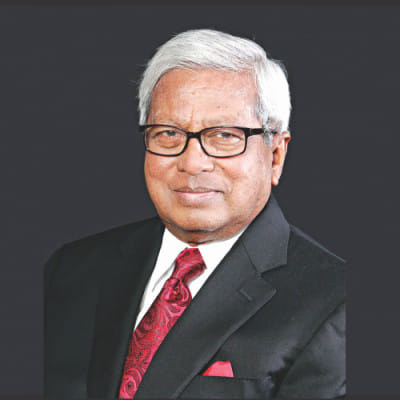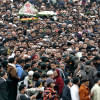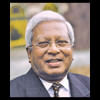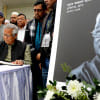A LIGHT HAS GONE OUT

Some personalities are so much larger than life that boiling down their accomplishments to a few words is an almost impossible task. Sir Fazle Hasan Abed is one such person.
His identity, however, synonymous it may be with Brac, actually far exceeds the organisation he built.
He was an institution unto himself, selflessly dedicated to bettering the lives of those around him.
Integrity. Humility. Humanity.
These words which define Sir Fazle Abed so well unfortunately only scratch the surface of who he really was.
The founder of the world’s largest NGO breathed his last aged 83 yesterday evening at the Apollo Hospitals in the capital. He was undergoing treatment for a malignant brain tumour.
Sir Fazle Abed leaves behind his wife Sarwat Abed, son Shameran Abed and daughter Tamara Abed.
Sir Fazle Abed’s entry into the NGO world came much before the formation of Brac. Working for the Shell Oil Company in Dhaka in 1970, he witnessed the devastating cyclone which hit the country, leaving 300,000 dead in its wake.
The disaster had a profound impact on him.
Together with friends, Sir Fazle Abed created HELP, an organisation that provided relief and rehabilitation to the worst of those affected in the island of Manpura, which had lost three-quarters of its population to the calamity.
The cyclone was followed by a bloody period in the country’s history as the Liberation War broke out a year later. The ravages of the war, coupled with Bangladesh having to take in millions of refugees, began to stretch already scarce resources.
This prompted Sir Fazle Abed to initiate Action Bangladesh and HELP Bangladesh, which lobbied the governments of Europe for his country’s independence.
At the time, Sir Fazle Abed was in London, where he was working as an accountant.
By 1972, however, he knew he could no longer stay away from his war-torn home. He quit his job, sold his London flat, and decided to spend all his savings to rebuild lives back home.
Sir Fazle Abed had found his calling.
The Bangladesh Rehabilitation Assistance Committee, as Brac was then called, took the first step of its thousand-mile journey from a humble office at Sullah, a hamlet of Sunamganj, in that very same year. It later styled itself as Bangladesh Rural Advancement Committee, before taking on the name Brac.
The initiative caught the attention of major NGOs and Sir Fazle Abed’s Brac soon secured funds from development agencies.
The NGO continues to grow and innovate even today, as it is heavily invested in yet another humanitarian crisis in Cox’s Bazar where it is working to help the Rohingya refugees.
Sir Fazle Abed’s body will be placed on the Army Stadium premises in the capital on Sunday from 10:30am to 12:30pm to let people from all walks of life to pay tributes. His namaz-e-janaza will also be held there at 12:30pm. He will be laid to rest at the graveyard in Banani the same day.
News of his death sent shock waves throughout the world, with many renowned personalities expressing their deepest sympathies.
Former president of the US Bill Clinton, in a message to Brac, said, “Abed’s story proves just how much people with vision and commitment can change the world.”
Brac Bangladesh Executive Director Asif Saleh said the Brac family will continue its journey to fulfill Sir Fazle Abed’s remaining dreams.
“He was a symbol courage and passion,” Asif added.
Sir Fazle Abed kept himself busy the last few months to look after Brac’s global governance. A global board has been formed comprising three members.
Brac’s future activities will be conducted under the governance of the global board, Asif said, adding that they have taken a 10-year strategy to run the organisation’s activities.
HUMBLE BEGINNINGS
Sir Fazle Hasan Abed was born in Baniachong of Habiganj on April 27, 1936, to Siddiq Hasan and Syeda Sufya Khatun.
He passed his higher secondary exams from Dhaka College in 1954 and got into the physics department at Dhaka University.
After a few years, he set off for England to study naval architecture. During this time, Sir Fazle Abed realised this new discipline did not have much prospect in Bangladesh and he focused on accounting, graduating from the Chartered Institute of Management Accountants in London in 1962.
After the Liberation War, he returned to Bangladesh, where he would go on to begin his life’s seminal work.
FROM ONE SMALL OFFICE TO 11 COUNTRIES
Since its inception, Brac has gone on to becoming the world’s largest NGO, operating across 11 countries in Africa and Asia. It employs almost 2 lakh people across the world and its microfinance programme alone involves some $3 billion.
Brac has always been at the forefront of empowerment issues and poverty reduction. It has led the way in many other social issues as well.
Brac was also the first to package and showcase the work of Bangladeshis artisans in Aarong, earning the craftspersons premium prices.
Brac’s diverse programme portfolio and global outreach now covers income generation, healthcare, education, agriculture and food security, water, sanitation and hygiene, advocacy and human rights, gender justice and diversity, environment, and climate change; all achieved under Abed’s leadership.
IN ILLUSTRIOUS COMPANY
Sir Fazle Abed is the second person in his family to be knighted by the British crown, the first being his great-uncle Justice Nawab Sir Syed Shamsul Huda. He was knighted in 2010.
In November this year, he was also honoured with the Officer in the Order of Orange-Nassau for his successful work in alleviating poverty, especially of women and children. It was bestowed upon him by King Willem-Alexander of the Netherlands.
In 1981, Sir Fazle Abed became a visiting scholar at the Harvard Institute of International Development.
The next year, he was appointed as a member of the Board of Trustee of Bangladesh Institute of Development Studies. He was also made the chairman of the Association of Development Agencies in Bangladesh.
This famous benefactor became a member of the World Bank NGO Committee in Geneva in 1986. The following year he was appointed as a member of the International Commission on Health Research for Development.
Sir Fazle Abed was also became the chairman of the NGO Forum for Drinking Water Supply & Sanitation. He was appointed as a board member of the Independent South Asian Commission on Poverty Alleviation.
In 1993, rights body Ain O Salish Kendra made him its chairperson. The next year, he joined the board of trustee of the Centre for Policy Dialogue.
From 1998 to 2005, he served as a member of many renowned committees, such as the Policy Advisory Group of the World Bank in Washington.
Sir Fazle Abed was the chairman of the governing body of Brac and the Commissioner for the UN Commission on Legal Empowerment of the Poor.
In 2010, he became part of the UN Secretary General’s Group of Eminent Persons for Least Developed Countries. Two years later, he became a member of the UN Secretary General’s Lead Group of the Scaling Up Nutrition (SUN) Movement.
Sir Fazle Abed was honoured with numerous national and international awards for his achievements, including the LEGO Prize (2018), World Food Prize (2015), Spanish Order of Civil Merit (2014), Leo Tolstoy International Gold Medal (2014), Inaugural WISE Prize for Education (2011), Entrepreneur for the World Award (2009), David Rockefeller Bridging Leadership Award (2008), Gates Award for Global Health (2004), and Ramon Magsaysay Award for Community Leadership (1980).
The many honorary degrees he received include those from Princeton University (2014), the University of Oxford (2009), Columbia University (2008) and Yale University (2007).
He retired from his role as the chairperson of the Governing Body of Brac Bangladesh and Brac International and became Chair Emeritus from August 2019.
“For the past few years, I have put a lot of thought and preparation into planning my succession at Brac. Now, at the age of 83, I feel it is the right time for me to step down from my role as chairperson and focus my time on guiding the future strategy of Brac,” Sir Fazle Abed said in his retirement message earlier this year.

 For all latest news, follow The Daily Star's Google News channel.
For all latest news, follow The Daily Star's Google News channel. 







Comments